Hamish McLachlan: Wayne Schwass on hiding his depression while playing AFL footy
WAYNE Schwass appeared to be an AFL player living the dream, but his reality was very different. He talks about his depression and trying to help others from making the same mistakes.
News
Don't miss out on the headlines from News . Followed categories will be added to My News.
- Men can learn to share pain
- Dangerfield: ‘I knew I needed help but didn’t want to be a burden’
- Alex Fasolo depression battle: Pies forward seeks help
- Amazing AFL player stories of courage and adversity
WAYNE Schwass. To many of us looking on, “Swatta” was simply another AFL player who was lucky to be doing what many of us dream of doing.
On the surface, all seemed to be going along as planned. The reality was very different.
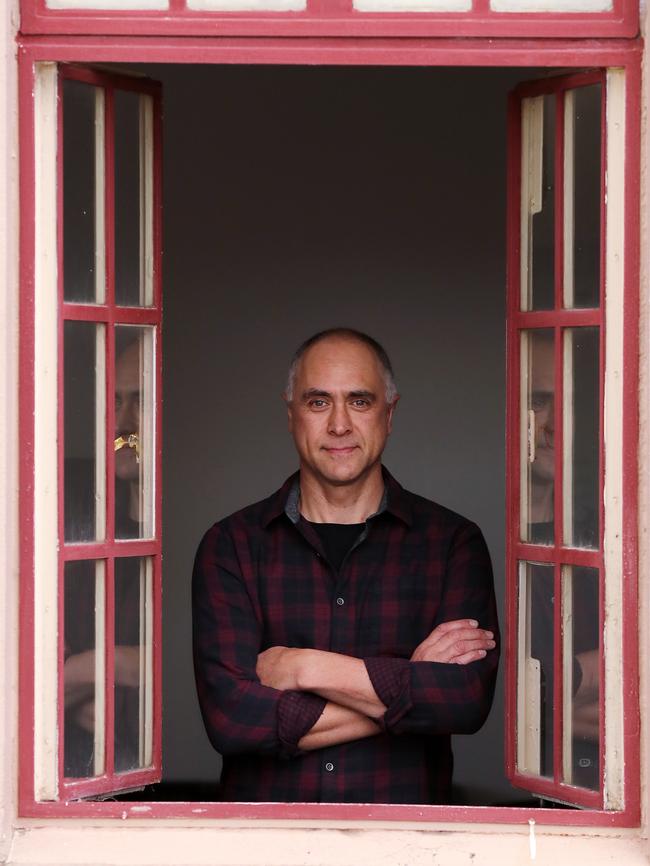
Behind the veneer was a man wrestling his mental health.
Days were suddenly removed of their colour, a “mist” of melancholy would float down upon him for no apparent reason.
Tears in lonely times, constant lies to those around him and years of hiding the truth.
Abusing alcohol and drugs to cope. Secrecy, he says, became the daily norm.
We spoke about his experience with depression, trying to take his own life, and how he is trying to help those from making the same mistakes he did.
HM: Swatta, 282 games, three best and fairests and a premiership. I feel like we should be talking about footy!
WS: (laughs) That all feels like a chapter written a long time ago, Hame.
HM: How many of those 282 games were spent anxious and suffering depression?
WS: More than 200 — 10 1/2 years of my 14 1/2 year playing career.
HM: You were diagnosed in ’93, after about 80 games?
WS: Yes, I was heading towards 100 games. I was diagnosed on the 9th of August, 1993.
HM: How long did you know something was wrong — how much time did you spend avoiding a diagnosis?
WS: I don’t think I was aware of what I actually had, or what was about to enter my life. I wasn’t hiding it, because I didn’t really understand what it was. I can recall days and periods up until the day I was diagnosed where I’d have these days of overwhelming sadness, for no rhyme or reason. I just couldn’t understand why or what it was. It was like a mist that would roll in and cover me in this deep sense of sadness. Without the knowledge, skills, understanding or emotional intelligence, I didn’t know how to react, so I just allowed it to be. Somehow it would pass, as if a gust of wind would move it on, and I’d be back doing all of the things I wanted to do. I wasn’t aware initially, but two weeks prior to being diagnosed I became acutely aware that something was wrong. Horribly wrong.
HM: How?
WS: On the 26th of July, I’d finished training and was driving home, and I’d stopped at a set of traffic lights and for no apparent reason I burst out crying.
HM: Did you feel embarrassed to cry?
WS: Embarrassed and ashamed. I grew up with this misplaced mentality and attitude that men didn’t cry. I associated crying with weakness. I was fit, I was playing a great sport with and against aggressive men, and crying was a form of weakness. This outburst of emotion was confusing and upsetting and I really had no understanding, or ability to process what was going on. This processed happened every day for two weeks until I was diagnosed with depression.
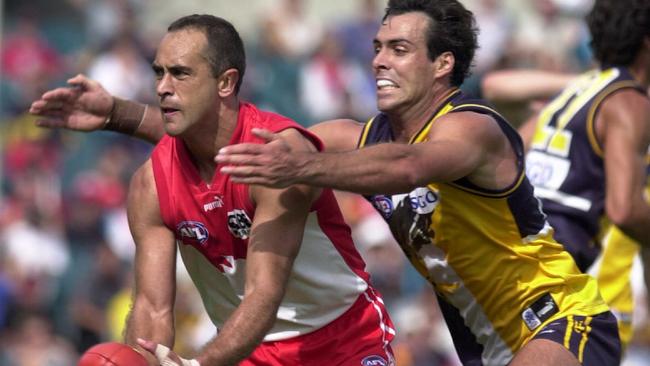
HM: Did you tell your now-wife, Rach?
WS: I wish I had, but no, I didn’t. Rach and I were recently engaged, but on that night and for that two-week period until I was diagnosed, I would park my car outside the house for as long as it took me to stop crying and compose myself before I could go inside the house. I did that because I was embarrassed and ashamed of letting my fiancee, the person who cared for me and loved me the most, see me like that.
HM: Was that the first time you’d broken down in tears?
WS: For as long as I can remember as an adult, yes. I don’t cry — unfortunately it’s not an emotion I have readily available — and this frustrates me enormously now as a father of three kids. As a young man growing up, I buried a big part of who I am, specifically my emotional side, because I mistakenly thought in order to be successful I needed to be tough and resilient, not soft and emotional — because that risked being seen weak. I feel like I’m not able to be the best dad I can be, especially when my kids are crying about something, because crying and that sensation is something that’s not in my toolbox at the moment. I’ve still got work to do, but back then I was emotionally bankrupt.
HM: And now?
WS: I’m trying to reconnect with my emotions, but it’s not easy when you’ve buried them for most of your adult life because you foolishly believed it was weak. My kids, like all kids, have gone through some challenges, and when my kids are upset, I don’t cry; it’s foreign to me and it bothers me greatly that I don’t have that emotion immediately available. I realised that earlier this year. I’m always looking at how am I as a person, a husband, a father, and looking at the things that I can improve on. One of the things I have recognised is developing and reconnecting the sensitive and emotional part of who I am.
HM: Your father is part Maori, born in Christchurch, and you spent a lot of time in Warrnambool. Were Colin, your father, and Rae, your mother, emotional people?
WS: Mum was. Dad’s not. My dad is from the old school where men didn’t talk about feelings, emotions or things that were causing them stress in the lives. Instead they internalise everything. I love my dad dearly and we have a great relationship which is far deeper and richer now than it was prior to talking about my issues with him.
HM: Why don’t men talk?
WS: My personal view, Hame, is that men aren’t taught, encouraged or supported to talk openly about issues beyond sport, work and kids. Women aren’t judged for talking and nor should they be, but unfortunately men get judged for talking about emotions, feelings, things that might be causing them stress in an area of their life, so we simply don’t. It's a real concern because each day in Australia, there are eight people who tragically lose their lives to suicide and six of those are men. That’s telling us something.
HM: Eight a day in Australia?
WS: Eight a day. We lose 2½ times the number of people to suicide than we do on our national road toll. In 2015, 3027 people tragically ended their lives compared with 1300 people losing their lives on our roads nationally in 2016. Now I’m not trying to downplay the devastation and the destruction that road deaths have on the families and the broader community, because it is devastating. We have daily reminders about the importance of road safety, as we should, and we are reminded every day about the number deaths on our roads — but how is it that suicide claims 2½ times more lives yet we don’t have the same level of investment, education, awareness and understanding? It is a national crisis which requires urgent and drastic action.
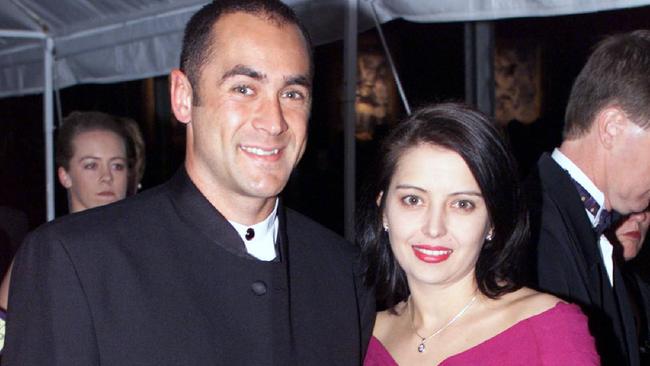
HM: And often because there is a fear of asking for help?
WS: Absolutely, yes. In my opinion, Hame, men either think, feel or believe that it is weak if they ask for help or they think, feel or believe others will think they are weak if they ask for help and that is fundamentally wrong. There’s enough research that supports the argument that boys are equally if not more emotionally expressive than girls in their earlier years. But something changes along our journey and it’s my view that what changes is that we are told by others and society what it means to be a man. What does it mean to be a man? We’re expected to be tough, resilient, loyal, hardworking, the provider, the protector, strong, stoic, even aggressive, and while I agree they are important qualities and values, why aren’t men encouraged and supported to be emotional, sensitive, caring, compassionate, empathetic, vulnerable, and loving? It’s because we are told that these emotions and values are a sign of weakness and that's not what men do. I feel like I’ve lived the majority of my life under the expectations others have paced on me or society expects from me because I am a man. I didn’t have the confidence, or emotional intelligence, to sit back and question or challenge this stereotypical moulding. All I’ve ever wanted was for people to accept, respect and love me for being authentic and genuine but I never allowed myself to show that person because I thought people would see me as weak or soft. I grew tired of being told don’t be weak, don’t be soft, don’t be a girl, be a man, men don’t cry! It’s taken me a long time to recognise, understand and appreciate men need to talk, they have every right to talk and they should be encouraged and supported to talk. The value of that is absolutely critical.
HM: When did you come out publicly and say that you had depression?
WS: I was diagnosed on the 9th of August, 1993, but I spoke publicly about my conditions on the 1st of March, 2006.
HM: Thirteen years later?
WS: Yes, unfortunately
HM: You were diagnosed in ’93 — at what point did you tell your fiancee, Rachel?
WS: I didn’t really have to tell Rachel because she was exposed to it from the beginning, the 26th July, 1993.
HM: You thought she would think you were a weaker man, and she’d leave you, so you hid your depression?
WS: Yes, I did.
HM: Better to bottle it up?
WS: Yes, it was my only option. At the end of the two-week period where I had no control over my emotions, Rach sat me down and said she knew something wasn’t right, without knowing what it was, and suggested we see my doctor to get an understanding of what the issues were. We subsequently made an appointment see my very dear friend, Harry Unglik, who was the North Melbourne doctor for 30 years. So on the 9th of August, 1993, we sat in his room for 45 minutes, and the only thing that I can remember in the conversation were the words he said towards the end of it our consultation, which were: “Wayne, you are clinically depressed”. That was the beginning of a very long and painful journey with mental health conditions.
HM: So only yourself, Rach and the doctor knew at that point. You were too embarrassed to tell anyone else?
WS: Correct. Rach and Harry knew out of necessity but there was no way I was going to tell anyone else about my conditions, including, family, friends, teammates or coaches. I was convinced I would lose friendships, relationships, opportunities and most importantly respect if anyone else knew what I was dealing with. From the day of diagnosis till October 2005 I consciously chose to hide my conditions every day and sacrifice my own health and wellbeing to protect my relationships, opportunities and people’s respect.
HM: Were they surprised?
WS: I don’t think they were surprised. I think it helped explained my behaviour or the way I was in their company throughout this period.
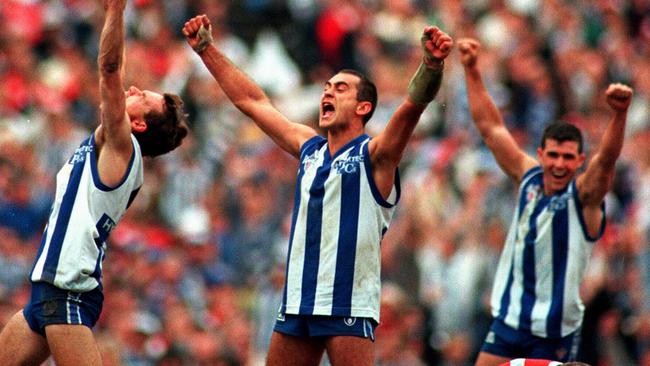
HM: What did your mates say when you told them?
WS: Regrettably I waited 12½ years before I plucked up the courage to tell my six closest mates, including Anthony Rock, Ian Fairley, Glenn Archer and Anthony Stevens. I decided to ring them the day before an article was going to appear in the Herald Sun about my experiences. I felt they deserved to hear it from me as opposed to reading it in the paper. When I rang them and told them what I’d been living with, they said two things that were very similar. One was: “How are you now and is everything OK?”. The second thing was: “Why didn’t you tell me, I’m your mate. You should have known that you could have told me. I would have supported you”. For 12½ years, I never gave them that opportunity; I made the decision for them because I thought they wouldn’t want to be my mates. I underestimated their friendships.
HM: Why is that? Why is there the feeling that mental health is different from other ailments?
WS: Because with any other form of illness or condition, you can see it or it’s easier to understand. Whereas mental health conditions aren’t as easily identifiable, we look the same, we try to act the same; there don’t seem to be any outward signs or signals that something’s not right. I’m not aware of stigma being associated with any other medical condition, but it does live and breathe for people living with mental health conditions. Stigma is discrimination and that's grossly unfair and it needs to stop. I believe we can stamp out stigma because of the generational change in attitudes that has occurred around racial vilification. The AFL has done a tremendous job of educating the industry and broader community that this is no longer acceptable, we now have a better understanding of the impacts of racial vilification, why it’s unacceptable, and the best example of this change is when supporters report their own members for racially vilifying a player.
HM: When you came out and told your close mates that you were clinically depressed, did you feel a weight off your shoulders? I’ve got a lot of mates that are gay, and when they come out they say it’s like they felt like they had 10 bears on their back, and they’ve all just jumped off.
WS: Yes, a tremendous weight was lifted off my shoulders because I didn’t have to pretend anymore. I could be myself.
HM: You had spent 12 years lying to almost everyone, thinking you were protecting yourself, but you were really harming yourself.
WS: I was trying to protect friendships, relationships, opportunities and respect, but that was at the cost of my health and emotional wellbeing. I sold my health and wellbeing away to protect the things that I thought were far more important. Once I told my family and closest friends and I stopped pretending, I was able to start being myself. I was able to focus on getting healthy and well instead of trying to hide my conditions. I started to stop worrying if people liked me, accepted me because of my conditions. If people choose to judge me negatively because I’ve lived with these types of conditions, that’s fine, that’s their choice, but equally I don’t have to take that on. What other people think of me is not my business. Ultimately, I always have the choice of whether or not I choose to except negativity or criticism because of my experiences. I have no animosity, towards other people’s criticism or negative opinions of me because that is their business. I’ll protect what’s really important to me, and that’s my health and wellbeing. I’ll continue to surround myself with people that accept and support me, knowing I’ve gone through some challenges in my life.
HM: It appears to me now that you enjoy speaking about it, because you understand the difference you can make for others. How long did it take you to go from sheepish about it all to where you are now?
WS: It’s a good question, Hame. It’s been a gradual process since I first spoke publicly in 2006. Up until late last year, I’d always felt that I’d spoken very openly and honestly. The reality is I’d always held things back. Over the past 12 years, there have been moments where I have wanted to walk away because of the emotional price you pay, but every time I’ve felt like doing that an opportunity has presented itself and reminded me of how much I really do enjoy speaking about these conditions and why it’s important we talk about mental health and emotional wellbeing.
As a result I’ve spent the past 18 months evaluating of my life and where I want to be, and it became evident through this process that the area of mental health was where I wanted to work.
I spent five great years working within the Telstra dealer partner network with.a great group of people, but once I decided where I wanted to spend my professional time I sat down with my former boss earlier this year and I said, with all due respect, I can sell a network, I can sell a phone system, I can sell any form of technology that a business needs to communicate, but I have not positively impacted a person’s life. While I was getting really well paid, I felt like something was missing and it wasn’t fulfilling for me. What I do now is the result of a 24-year journey. A result of living, learning, understanding and educating myself around what mental health conditions are, how they impacted my life, learning the necessary skills including talking and communicating, being able to ask for help, and most importantly bring those people closest to me into my conversations and world when you need it. I have a much better ability to self-regulate and identify what causes me stress. I spent so much of my adult life living a life according to the expectations that others had placed on me, or society expects of me. I always worried about what people would think, say or do, if I was really authentically myself. I’m authentic now, and I’m happy and comfortable with the person that I’m becoming. I’m happy with where I want to go, for the No. 1 reason is that it’s important to my health, and my wellbeing. It’s a really important thing to talk about because there are so many people who are struggling with challenges, specifically mental health conditions, who feel isolated, who feel alone, and who feel like they don’t have any connection or options. Sadly, there are eight people at the end of every day who feel they have no other option but to end their own life. It’s tragic and devastating and I can’t sit by and allow that to simply happen without trying to make a difference. I have committed my voice to this important cause because I know realise it is my passion and purpose. I’ve finally figured out what I’m on earth to do.
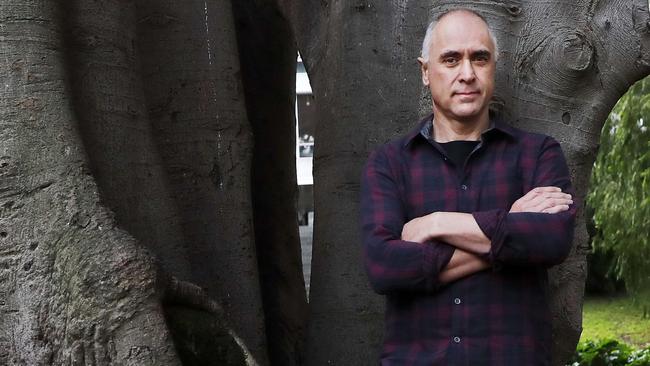
HM: We know you are in the media now, but that’s not what is feeding your soul. What does the day look like now, and where do you hope you can take your new challenge?
WS: I was fortunate that very close friend and mentor who has been successful in business and understands my passion who has also been on my journey for the last 12 years has invested capital into PukaUp to allow me to pursue this passion. PukaUp is our new social enterprise, which focuses on mental health, emotional wellbeing and suicide prevention.
HM: Puka means what?
WS: It’s a Hindi word that means “authentic and genuine” and I was neither of those two values for a very long time. They’re important values that I live by daily, because it helps me to stay healthy and well. It’s also representative of the message that PukaUp wants to spread throughout the broader Australian community. We want people to understand that it is perfectly OK and really important that you’re authentic and genuine, open and honest, about your mental health and emotional wellbeing. When you’re not, you find yourself on a journey that I went on for a long period of time.
HM: So PukaUp is your daily go-to now. Is it a foundation?
WS: Yes. I am fully committed to PukaUp; it’s now my life’s work professionally. However, it’s important to note that PukaUp is not a charity, it's a social enterprise. There are more than 54,000 DGR status charities in Australia, and we have 600,000 charities across the country. There’s been an exponential growth in charities in Australia, but the funding pool hasn’t matched the growth. In actual fact, you’ve got more charities competing for less money. It’s the shared view of the board that it’s not a sustainable business model, unless you’re one of the big charities who get the majority of the funding available. We have deliberately and strategically decided to create a social enterprise to ensure we have sustainable funding to deliver on our vision which is to “create the environments for every person to have authentic and genuine conversations about mental health and emotional wellbeing”. We will look to deliver two major events over the next ten months, including a suicide prevention bike ride from Sydney to Melbourne and documentary. To be very clear, the reason why we decided to set PukaUp as a social enterprise is based on our previous experience with the Sunrise Foundation, which ran for five years, and raised over a million dollars. The Sunrise Foundation delivered preventive education programs to more than 5000 kids here in Melbourne. We were running four programs, but unfortunately due to the funding constraints associated with philanthropic grants we couldn’t scale the programs and therefore closed the charity. In addition to private investment, which we secured earlier this year, we will fully fund the bike ride through sponsorship. That funding will then allow us to start to invest, without any caveats or funding restrictions, into social initiatives that we want to be involved in, and have full control over that. What we are aiming to be at PukaUp is a self-sustaining business, which invests into creating safe, supportive and non judgmental conversations and environments, using traditional and non-traditional platforms where these vital conversations live, breathe and exist, every day for every single person in the country.
HM: Seems ideal. The conversation, it seems, is getting easier to have for those with depression and other mental health issues. In your view, it’s seemingly miles from where it needs to be?
WS: Absolutely. These are conversations that need to happen in every home. Every workplace. Every sporting club. Everywhere people get together. The reality is, one in four people will live with a mental health condition at any point in their life during a 12-month period. According to the World Health Organisation, as recently as March this year, 350 million people are living with mental health conditions globally.
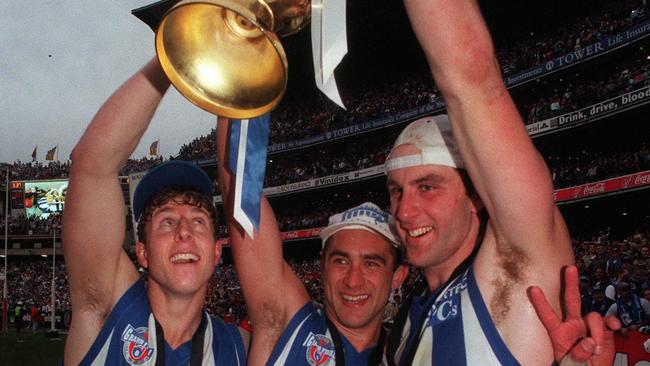
HM: And how many of those do you actually think are happy to talk about it?
WS: A very small percentage, unfortunately, but when we have people like Osher Günsberg, Stephen Fry, Leisel Jones, Libby Trickett, Ian Thorpe, Barry Hall, Matthew Mitcham, Lauren Jackson and other high-profile people that come out and speak openly about their experiences, the ripple effect in the broader community is profound. There are so many people in the broader community who may listen to this or read this that are privately dealing with these conditions feeling isolated, hopeless, helpless, and like they’ve got no connection and very little hope. We need this conversation to really become part of everyday conversations, because people are really doing it tough. Your fundamental right as a human being is the best available treatment, without fear or failure. Ridiculing, labelling, or criticising people because of legitimate mental health conditions, needs to stop. That’s stigma and stigma is discrimination.
HM: Just going back to ’93. You said you were driving home and you broke down in tears in traffic. Was that the first sign of an issue, or had you felt things previously? You talk about the mist that comes in — I assume that’s after diagnosis or after that night. Were there any things that our listeners or readers could look at and think, you know what, I’m feeling that often?
WS: Yes. The mist had entered my life before being diagnosed. I’d feel really sad and I couldn’t work out why. I didn’t really give it the attention that it probably needed, and just allowed it to pass through of my life.
HM: There’s a great mate of mine, and you know him well. I’ll try and get hold of him for a week, two, three or four, and he goes missing. I ask him if he’s OK, and he’ll say, “I am now”. I ask him where he’s been, and he’ll say “black dog”. He just doesn’t want to speak to anyone, he doesn’t want to be found. He runs a hugely successful business. He says, “I’m crook”, and he can’t get out of bed. Did you go through that?
WS: Not the getting out of bed part. When I was diagnosed, my immediate response was, give me six months. Let me get myself right. I wanted to run away. I didn’t know how to deal with it. Fortunately for me Harry said no, we are going to keep you playing and training, because that structure is going to be really important. I never missed a game. I never missed a training session. You have no idea the difficulty I faced in going to training and playing. I lost count the number of times that I would walk into a training session, or a game, go into Harry’s room, close the door, lock it, and burst out crying. I was pleading and begging Harry, telling him that I just couldn’t do it. I can’t do this. Let me go home. My wife, bless her, and Harry never failed me once. They never gave up on me when I was prepared to give up on myself. I feel incredibly thankful that these two wonderful people they never failed me. I can honestly say Rachel and Harry kept me alive through some very dark times.
HM: How dark were your darkest days? Did you ever feel like ending it all?
WS: Yes — on stage collecting my 1996 premiership medal from Jack Dyer on what should have been the best day of my life, I’m thinking about how I could end my life.
HM: That day?
WS: Yes, on that day, but I was very suicidal from 1993 through to 1997.
HM: How close did you get to committing suicide?
WS: Regrettably I put myself in three potentially life threatening situations.
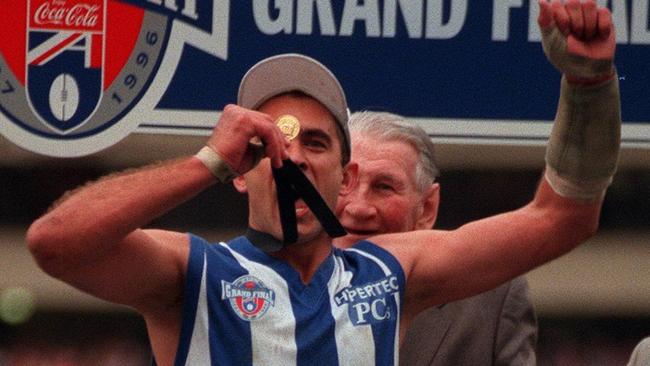
HM: 1993, ’94, ’95, ’96, ’97. You were thinking of ending it all?
WS: Yes. I’d won back to back BNFs ’94 and ‘95. A premiership in ’96, and on field looked to have been really successful and really happy, but I wasn’t. The interesting thing about this, Hame, is — and again, this is not to be critical of the industry, the code, coaches, clubs etc — I was trained and educated to cope with stress in one area of my life. Fill the MCG with 100,000 people, put an aggressive team in front of me, with my teammates, and I loved it. I thrived on it. I wanted it. I could cope with that stress. The more stressful on the ground it was, the more I thrived on that. Unfortunately I didn’t have the education, or the skills, to cope with stress off the football field. I was fundamentally bankrupt as a man with no emotional connection, no emotional intelligence. No confidence, or courage, to be able to deal with real-life issues.
HM: That is a staggering place to be.
WS: That’s how it was.
HM: In terms of getting better, did Harry put you on medication? Did the structure of football help you?
WS: Harry prescribed medication, but I only took it for two weeks after being diagnosed. I saw medication as a sign of weakness so I stopped taking it and I started self medicating myself with alcohol and marijuana. The only tools I had available to me to try and cope were alcohol and marijuana and I abused them. A lot. The only reason I did that, and I’m not a big drinker, was because that was the only way that I felt I could cope with the pain that I was going through.
The structure and routine of football helped me maintain some level of normality, but when you’re experiencing serious mental health conditions as I was during this time, my reality was distorted. I’d lost control of my mind effectively because of these conditions.
HM: What did the drink and marijuana do for you?
WS: I never drank to enjoy the taste, or smoked to enjoy it, I just drank and smoked to obliterate myself. Once I got to a certain point, my mind stopped thinking. When you’re under the grip of a serious mental health condition, there’s this incredibly negative, toxic, destructive conversation going on internally all the time. I didn’t have the ability or the skills to stop that. I would drink, or smoke, in order to deal with it. It didn’t deal with it, and the irony of it was that I knew every time I did one of those things, I was doing the wrong thing by myself. Unfortunately, I didn’t have the courage or the confidence to be able to stop it at the time. The times I did take medication I hid it from Rachel again because of the shame, embarrassment and guilt I felt because I took medication.
HM: Even though she was on the journey with you?
WS: Yes. I hid it, and I wouldn’t allow her to see me take it. It’s a really pathetic way of looking at it.
HM: This is the person you love most in life, and she loves you most in life, and still, as a male, you’re unable to share it.
WS: Yes, because ignorantly I thought I could think my way through a mental health condition. That’s irony; it was never going to happen, I needed professional help. As I said earlier, I saw medication as a weakness. I believed depression was for weak people. It was for people that had low socio-economic backgrounds. People with character flaws, people who had bad upbringings. or did bad things. It was such an ignorant, arrogant, uneducated way to think. Fortunately I don’t think that way anymore, but that was my view of mental health conditions back then. Mental health conditions can affect anybody, from any background, any race, any religion, any sexuality. It does not discriminate. You can be the richest person in the world walking and yet you can still be affected by a significant mental health condition.
I was also put into contact with two male psychologists. It didn’t work. I lied my way through every one of those appointments, because I didn’t know how to talk to another male. I didn’t have the confidence, the skill, or the maturity to be able to talk like we are now. I saw that as a threat. I am not telling this person in front of me, who by the way is trained and has the skills and resources to help me with what I’m feeling. I’m going to tell you what I think you want to hear, and then I’m out of there. During that period I would only accept the first appointment in the morning or the last at night. I always wore a cap, and took the paper with me. First and last appointments because there were fewer people in the waiting room, the cap because I wanted to hide my face, and the paper because I could hide behind it. The receptionist could only call my first name, never my surname. Interestingly, throughout my entire footy career, if I felt physically sick and I had a game against a team on the weekend, I wouldn’t hesitate to see Harry or our other doctors, even if they were fully booked. I would walk in there, no hat, no paper, no cap, without caring what type of day it was or who was in the room, because I wasn’t ashamed or embarrassed about my physical health, but sadly when it came to my mental health, the shame, the guilt and the embarrassment were paralysing.
HM: Does the mist still roll in?
WS: Yes, but it doesn’t stay. It doesn’t set down. I lost all the colour in my life from 1993 until 1999. All the colour in my life disappeared. I lived every day during this period with what felt like a damp fog on my forehead. This might sound crazy, but I lived in the third person a lot. It was like I was watching myself just exist with no vibrancy or enthusiasm. There was no zest for life because I’d conceded complete control to my conditions. These conditions had eroded all of the values, self-worth, confidence that I previously felt and thought that I possessed. It wasn’t until 1999 that I had an epiphany at the SCG during a training session while playing with the Sydney Swans where I realised that I’d wasted six years of my life, I was borderline alcoholic, and as a result a lot of my relationships were very fragile. After training finished that day, I walked into the doctor’s room, shut the door, and said that I’d been clinically depressed since 1993. I was sick, and I needed help.
HM: This is to the Sydney doctor?
WS: Yes, Tom Cross, who was the junior doctor at the club at the time.
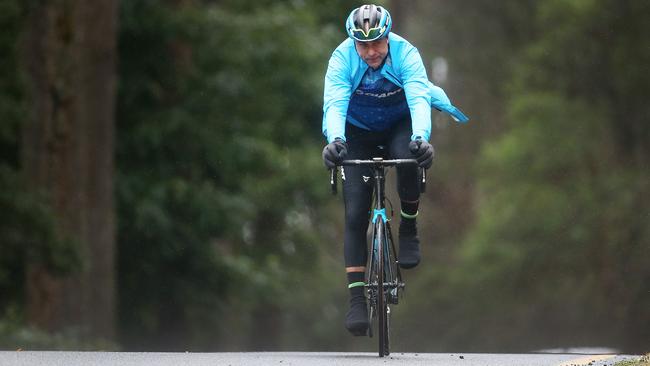
HM: What did he suggest?
WS: Thankfully he put me in contact with an incredible lady psychiatrist called Lisa Lampe, and quite frankly she was a lifesaver. It was easier for me to talk to a lady because I didn’t feel the barrier was there. I spent 4½ years with Lisa, understanding depression, anxiety, and obsessive compulsive disorder. What were these conditions? How they were impacting my life? How are they controlling how I feel, think and behave? I waited for six years to ask for help, and it took me 4½ years to get healthy and well again. I would cry my eyes out and I would say to Lisa, I just want the colour to come back in my life. I want to feel the sun, the warmth on my back, or to look at the beautiful spring flowers and the grass, because I had none of that. I can vividly recall a day about 2½ years into working with Lisa where I was driving around Sydney and I just stopped the car. I thought to myself, shit, I’ve had five minutes where there’s been no negative thoughts. As simple as that sounds, it was the first time since the 9th of August, 1993 that I had some control over my thoughts. It felt amazing. Up until that point, my days were filled with so much negativity it almost killed me. I started to believe I could get healthy and well again after this day
HM: What sort of thoughts were they?
WS: I was convinced I was a fraud, a fake, a liar and a bad person. If people found out that I was living with mental health conditions, my life was over. If anybody is in that position today, having these thoughts, please don’t waste another moment. The sooner you get to a doctor, then to a professional to get the help you deserve and start making lifestyle changes in your life, the quicker you can get healthy and well again.
HM: And that was constant in your head?
WS: Every single day, Hame, without fail. It was the same negative, destructive, toxic record playing continuously every single day. It took all of my energy just to get through each day. I hated the thought of waking because I knew the moment I woke up, the negative thoughts started again, and I also hated going to bed because I knew once I finally got to sleep, the next day this negative, self destructive battle would start again. It was soul destroying. There’s no other way of describing it.
HM: Exhausting?
WS: Incredibly. It took every ounce of energy and effort to pretend, to hide my conditions and to make sure no one suspected anything, and that left very little energy to train and compete. I played many games where I was there physically but I was not there emotionally. I was spiritually and emotionally broken and how I managed to play, and perform and have a reasonably successful career is largely down to Rachel and Harry never failing me. This is one of the reasons why I really talk openly about it. I want people to understand that these things can be overcome. You can get through it. It’s really important not to make the same mistakes that I made, as often as I did, and for as long as I did. If we concede control to our conditions, they can ruin our life. It’s not worth that. If we need an operation, or if we’re diagnosed with cancer, we want to tell people that care about us because importantly we need their support.
Yet we don’t approach mental health conditions in the same way. Our mental health is more important than our physical health. Why? Well, we need to look at our body as a vehicle. Our motor is our brain and our physical body is the chassis, wheels, doors, windows, etc, but if we ignore our motor (brain) if it’s not running well, and it’s not working the way it should, at some point it will influence us physically. Our mental health has a significant impact on our physical health. They are not mutually exclusive and both play an important role in our ability to perform and function in life as well as enjoying life and being happy.
HM: It’s a point well made. If you thought you had cancer, but decided not to see a doctor, you’d be a very foolish person. If you think you have a mental health issue, but don’t address it, you’re equally as foolish.
WS: Yes, absolutely. It can potentially have just as big an impact as what cancer or any other form of medical condition can.
HM: Tell me, symptoms now. Are you on medication now?
WS: No.
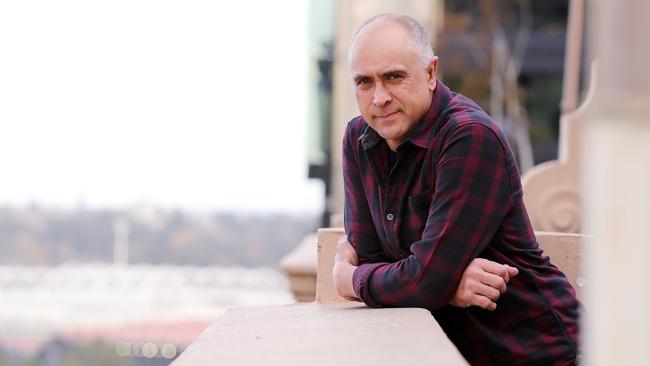
HM: Do you see a Lisa or a Lisa equivalent now?
WS: No, not anymore. It’s a good question to ask, Hame, because last November I was working too much and not getting enough sleep and as a result, I started to feel the early onsets of sadness and anxiety. From there, I did things that I never used to do. I went inside and told Rach. I talked to her. I told her I wasn’t feeling great and she asked me questions like how much work are you doing? Are you getting enough sleep? Immediately, I started to recognise a few triggers. I rung my dad and told him I wasn’t feeling 100 per cent at the time. I felt better about telling them. Then I rang Harry, and made a time to talk with him. Harry and I talk and we establish what is actually going on. We work through the triggers: I was working too much and not getting enough sleep. I needed to start to back it off a bit. I then asked him about medication. He asked if I thought I needed it. I wasn’t sure. These are all things that help me manage my mental health. I also sat down with my boss and my former employer. I told him I needed a few days off, I’m feeling anxious and stressed, and I just feel like I need to take some time out. He was very supportive and understood the situation.
HM: But all of those things are unable to happen unless you address it.
WS: Absolutely. How good would the world be if we can get to a place where people can do that on a regular basis? When people are starting to get anxious, and they’re starting to feel like there’s a mental health condition starting to let itself into their life, they talk to their partner. Their family. Their GP. Their employer and they seek help with a professional, That’s the aspirational goal for me.
HM: How long were you on medication for and why did you get off?
WS: I was on medication for the 4½ years I played with Sydney and this time I didn’t hide it from Rach — it was now out in the open. Medication didn’t fix my issues. it stabilised my moods, which allowed me to work on developing the skills and knowledge with my counsellor. Have I taken medication in retirement? Yes, absolutely, and if I felt like I needed it again, just like I might need Panadol or Nurofen, I wouldn’t hesitate. My health and my wellbeing is really important. I have a wife and three kids at home, and they need their husband and father being healthy and well for as long as he can be.
HM: The hardest thing for you through the whole journey, from ’93 to now, I assume consisted of two things. One, going and seeing someone and discussing it for the first time, and two, going public with it.
WS: The hardest thing for me was the fear of what people would say once they knew I lived with mental health conditions. Losing friendships, relationships, opportunities and respect. That was the hardest thing. Those four things were the things that I would wake up with every day, and I would think to myself, I’m not risking them. Under any circumstances. I will protect them by staying silent and sacrificing my own health and wellbeing.
HM: And since you’ve come out, and almost become a spokesman for mental health, how many people have come to you and said, talk to me, help me?
WS: I created a public Facebook page on the 3rd of October last year, and we now have more than 6000 people being involved in that community. I would encourage anybody who is living with these conditions to become involved: I created it for you. I want people to enjoy this community because it’s safe, it’s supportive, and it’s not judgmental. If there’s anybody that wants to join this community, come and join. The door’s open. Come and join this conversation. And to answer your question, I get messages every day from people asking for help or sharing their own triumphs.
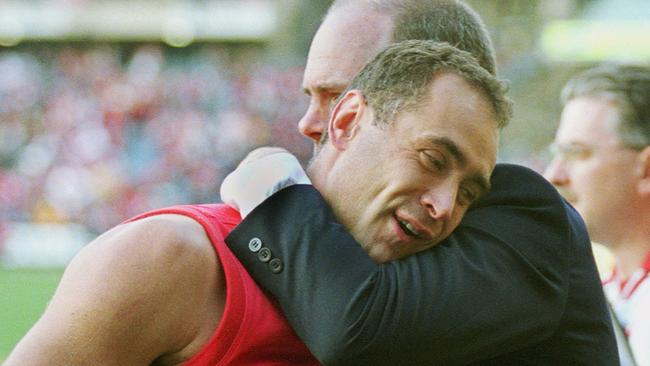
HM: I read there was someone that was on a bridge, about to end it all, and this community saved his or her life.
WS: That’s true. I had been invited to talk at one of my children’s schools about what it meant to me to be a father, and any opportunity I get to speak, Hame, is an opportunity where I have a chance to connect with one person in the audience. On this particular day we had 400 parents turn up and I was asked to deliver a 15-minute presentation, and always in the back of my mind I’m thinking to myself, was that beneficial? Did that help? Did that connect? And I always hope it connects with someone. I didn’t appreciate how much it connected until I received a message the next day. It was from a man who was in the audience the previous day. He was a father of two kids whose marriage had ended, and he was doing it very tough. He hadn’t reached out for any help. On the morning of my presentation, he was standing on a bridge about to end his life when he remember I was going to be talking that day at his kids’ school, and thankfully he decided to hop off the bridge and come to the presentation. Once he saw the presentation, he reached out to some family and friends, told them what was going on, and I glad to report he is getting the necessary help. That’s why I do what I do.
HM: That is unbelievable. Just on things that you’re doing now to put yourself in the best mental spot: You’re on social media, how do you avoid that affecting you? Are there any warriors that upset you?
WS: No, I accept the fact that social media gives a platform to people to voice their views. I respect that people might have differing views, and that’s OK. If people want to be negative or critical, again it’s my choice whether I accept that or not.
HM: And you’ve got better at moving on, and driving on?
WS: Well, what’s the point? If people want to judge you differently because of a medical condition, that’s their choice. Ultimately it’s my choice whether or not I accept that, whether I take it on board, or I leave it there and keep moving in another direction. There are certain things that I do.
HM: You’re very fit. You’re doing a lot of exercise.
WS: I ride a lot.
HM: And that helps you?
WS: It’s important physically that I maintain a good level of fitness, but my bike is very spiritual for me. That might sound crazy. I can have a tough week or be confronted with a situation that’s causing me a bit of anxiety, but if I go on a ride on my own, when I come back, I’ve got clarity. I understand, or I have a better appreciation of what I need to do and here’s a way to work around it. Riding has become important from a physical fitness point of view, but riding is very important from an emotional point of view. It’s just my place that I go to, to do what I need. I talk to my wife, constantly. I talk to Harry. I spoke to Harry last week and I tell him every time I see him how much I love him and how much he means to me.
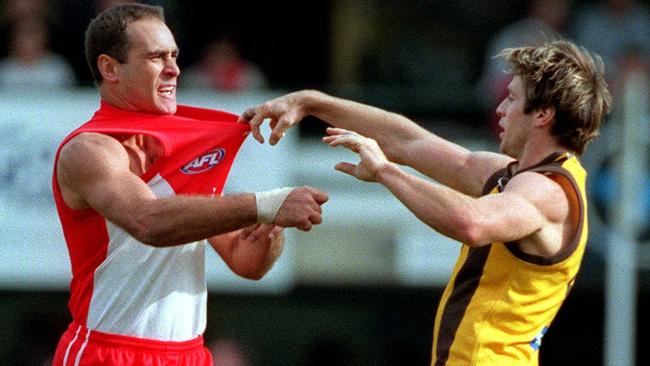
HM: How many blokes have you told you love in the last 10 years, versus the previous 30?
WS: I never told any males in my life, that I loved them. Even my dad, until I spoke publicly.
HM: Is that right?
WS: Yes. It’s taken me 48 years to get to this place, and staying healthy and well is due to physical exercise, eating well, and talking to the key people in my life. If I’m struggling with something, I’ll do what I need to do, take the medication, see my doctor, talk to my wife, talk to Harry. Underpinning all of that is that I’ve stopped worrying about what people are going to say or think. If people think that I’m different, or they’re not comfortable with what I’m saying, then that’s OK. This is who I am. There’s only one person that I need to get approval from, with regard to who I am. That’s myself. That’s not to be self-indulgent, but I’ve finally arrived at a position in my life where I feel good about who I am. I’m comfortable with the person that I am, and there are some things that I hid for a long period of time that I’ve reconnected with.
HM: Last one for you. For those that are either feeling flat, or perhaps are thinking that they may have depression, what would you say to do as soon as they’ve heard this?
WS: If there’s anyone listening, or reading this conversation, that feels stressed, anxious, and thinks it may be depression, bipolar, schizophrenia, or any number of mental health conditions, let me say that you are doing an amazingly good job under very difficult circumstances. You’re not alone, it’s tough. There’s an enormous amount of professional help available to you if you can find the courage and strength you possess on a daily basis to put up the fight and deal with the crap that you’re dealing with to ask for help. Don’t wait like I did, because the sooner you ask for help, the sooner you can begin the process of getting healthy and well. The other thing that I would say to anybody that is dealing with this is: you are worthy and you are deserving to be healthy and well. There is an enormous amount of people, like myself, that would support you and we’re all part of the bigger community. Together, we can start to get our lives back on track, and change the attitudes and perceptions.
HM: You say ask for help. Is there a line, or a website, that you would send people to as the best portal?
WS: I think the best place to start is with your family GP. Your GP is a great starting point, otherwise talk with your partner, family, trusted friends. Reach out and ask for help.
If you’re not sure where to start, Beyondblue have a great resources section, as do Sane, Lifeline, Black Dog Institute, Mensline, Kidsline.
HM: Thank you for being so generous with the chat. I’ve only known you for 10 years, but I’ve never known you happier, and that’s bloody great to see.
WS: Thank you, Hame. Love you, mate.
For help, @pukaup (Facebook), @wayneschwass (Insta, Twitter). www.pukaup.com
Those seeking support can also contact Lifeline on 13 11 14, or Beyond Blue on 1300 22 4636 or at beyondblue.org.au


